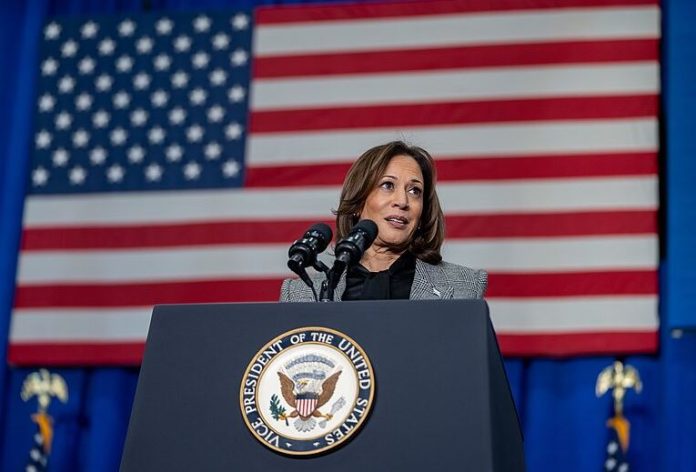From #KHive to Brat, Vice President Kamala Harris’ presidential bid has been shaped by a myriad of cultural labels connected, whether directly or indirectly, to the intersections of her racial, gender, and familial identities.
Most recently, her Black and Indian identities have come together, as voters have reimagined the term “auntie” in reference to Harris, according to Pennsylvania Capital-Star. Harris also self-identifies with the term on her social media profiles.
But the term is complex. While it affectionately compares older women to blood-related, caregiving safe havens, it has also been associated with negative stereotypes in both the Black and South Asian communities. Even Harris herself has previously rejected the term in a 2019 video she appeared in with actress Mindy Kaling, Pennsylvania Capital-Star reported.
For Black women, the term comes with a diminishing tone, Imani Perry wrote for The Atlantic. Historically, it reflected that an individual was not deserving of a more formal title like Mrs. or ma’am, and for some Black women, the term is simply too familiar, especially when the “auntie” bond has not been formally established. For South Asian women, the term can be associated with prying, gossiping, badly intentioned older women who seek to tear down younger South Asian women, according to Burnt Roti. Outside of the diaspora, though, the term has also evolved to be its own formal status, particularly in Black and South Asian countries, The Atlantic elaborated.
In its most recent iteration, however, Harris’s identity as an “auntie” has appealed to older South Asian woman voters. Sarbani Hazra, who is of Bengali heritage and self-identifies as an “auntie,” told Pennsylvania Capital-Star that she now feels galvanized to work for the campaign or even run for local government.
Across her past two presidential campaigns, Harris seems to weave cultural moments and references heavily into her messaging.
A 2017 post by MSNBC correspondent Joy Reid is often cited as the author of the name K-Hive, now formatted as KHive, in reference to then-Senator Harris’s supporters, according to The New York Times. During her first presidential campaign in 2020, Harris embraced the Twitter hashtag #KHive, a spin-off of the BeyHive, the singer Beyoncé’s fanbase’s nickname. While the hashtag is not as prevalent in her current run for the presidency, she now uses Beyoncé’s track Freedom as a campaign song. The song is from her album, Lemonade, known for its direct confrontation of issues and experiences of Black women, Vox explained.
Furthermore, the singer, who has largely refrained from openly participating in presidential politics since former President Barack Obama’s campaigns, is also allegedly setting aside a hefty sum of $4 million towards the campaign, according to a source cited by DailyMail.com.
In 2019, Harris wrote an article in ELLE about being the stepmother to Doug Emhoff’s two children, who affectionately refer to her as “Momala.” The moniker made a comeback this year after a 2021 statement by Republican now-vice presidential nominee JD Vance resurfaced, which incorrectly mentioned her as an example of the “future of the Democrats (being) controlled by people without children.”
While Harris and her campaign skillfully maneuvered around the mislabeling, the nickname’s traction made people question whether it could be mishandled.
On The Drew Barrymore Show, the show’s eponymous host known for sitting close to her guests told Harris, “We need you to be Momala of the country.” Charles Blow wrote for The New York Times that the utterance was inappropriate, explaining that it veered towards the mammy stereotype that historically forces Black women to take on caregiving, motherly roles, particularly of White children.
“Our country may indeed need moral guidance and collective counsel, but Black women are not obligated to provide it,” Blow wrote.
In what is likely the biggest cultural moment of Harris’s current presidential campaign, Charli XCX, an English singer of mixed Indian and Scottish heritage, confirmed on X that the vice president is “brat.”
For those unfamiliar with the vernacular, “brat,” stylized in all lowercase, is Charli XCX’s newest album, a collection reminiscent of circa 2014 club beats. The word spread like wildfire on social media, becoming a vague label as we all enter what has been called “brat summer.” USA Today explained the terms in further detail.
“You are just that girl who is a little messy and maybe says dumb things sometimes, who feels herself but then also maybe has a breakdown but parties through it. It is honest, blunt and a little bit volatile. That’s Brat,” Charli XCX said about being “brat.”
The album became relevant to the vice president’s presidential bid when Aly McCormick, a student at The George Washington University, edited clips of Harris together over Charli XCX’s song 360, about partying and feeling good, The New York Times wrote.
All politicians find ways to identify with and appeal to the common man. 2016 Democratic nominee Hillary Clinton struggled to make this connection, especially as she urged young voters to “Pokémon Go to the polls,” and even after beating Republican nominee and former President Donald Trump in 2020, President Joseph Biden recently failed to instill confidence both in and outside his voter base, as the nation questioned his cognitive health, leading him to drop out of the race.
Biden’s unexpected exit combined with Harris’s suave cultural campaign has breathed new life into the Democratic Party’s push for the presidency.
AsAmNews is published by the non-profit, Asian American Media Inc.
We are supported through donations and such charitable organizations as the Robert Wood Johnson Foundation. A big thank you to all our readers who supported our year-end giving campaign. You helped us not only reach our goal, you busted through it. Donations to Asian American Media Inc and AsAmNews are tax-deductible. It’s never too late to give.
Please also follow us on Instagram, TikTok, Facebook, YouTube and X.

